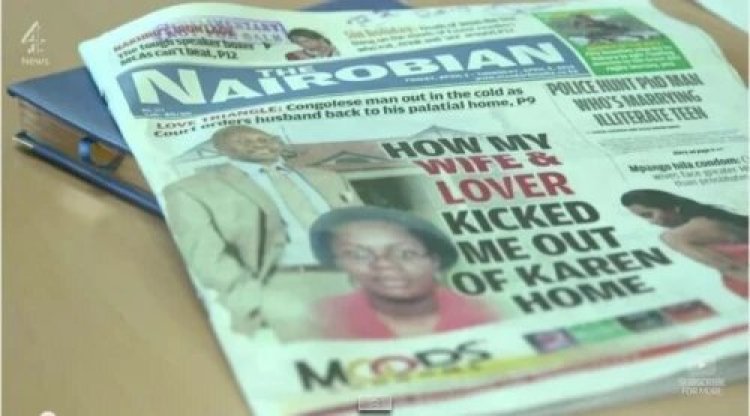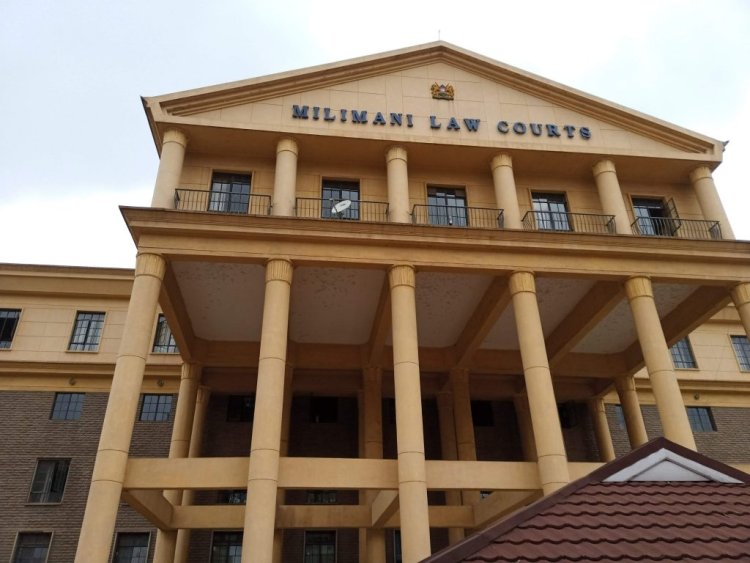Article About Ex-Cop Linda Okello That Cost Standard Group Ksh6.5M
Okello's suit against the Mombasa Road-based media house arose from the article which claimed that she would be the chief guest at a fundraising event

A story by the Nairobian newspaper, a subsidiary of the Standard Group Limited, published between May 16-22, 2014 with a picture of former traffic officer, Linda Okello, led to the media house being forced to pay her Ksh6.5 million in damages for injuring her image.
Documents from the High Court ruling made on Wednesday, August 23 and obtained by Viral Tea showed that Okello's suit against the Mombasa Road-based media house arose from the article which claimed that she would be the chief guest at a fundraising event and was expected to interact with Nairobi's biggest personalities.
The event was a charity event meant to raise funds to buy sanitary towels and underwear for poor girls, coming after the viral photo of her on duty wearing a seemingly tight skirt, considered immoral in her profession drew the wrath of her superiors at the police force.
How It Unfolded
The Nairobian newspaper quoted remarks by the brainchild of the project explaining that the organisers settled for Okello owing to her celebrity status that emerged as a result of the viral photo, thus drawing larger crowds to the fundraiser.

Image of the Nairobian newspaper. /STANDARD DIGITAL
The initiative was viewed as a means of raising money through the washing of cars which included former Nairobi Governor Evans Kidero's ceremonial limousine and other classic cars in the city. Motorists were being charged Ksh1,000 with volunteers parting with Ksh500 for every car washed and anyone who paid more than the amount would be declared the winner of the event.
Standard Group however filed a defence denying Okello's claim and further stated that if the story was defamatory, which was denied, the same was published with regard to a matter in which the public had a genuine interest.
The media house also averred in their defence that they would rely on the defence of fair comment on a matter of public interest, however, Okello produced her statement as her evidence in chief to support her argument.
"In the said statement she stated as follows; That at the time of filing the suit, she was a Police Officer deployed at Kiambu County Traffic Base. She was informed on 16th May 2014 about an article published in 'The Nairobian' Newspaper that she had allegedly accepted to grace a car-wash event dubbed "carwash -for-pad, panty campaign" scheduled to take place in Nairobi, which she confirmed upon purchasing a copy of the newspaper," read the court documents in part.
Okello's Argument
Okello further argued in the written statement that she had never been contacted about the event or been involved in any meeting or event of the nature reported and had also not been contacted to clarify the details of the article which did not align well with her employment status as a Police Officer.
She thus termed the article a falsehood, injurious to her reputation and social standing as a Police Officer, leading her to defend herself on numerous occasions before her colleagues who had formed an opinion that she was an attention-seeking socialite, crowd mobilizer, headliner, and an indisciplined Police Officer with no regard for the Police Code of Conduct.
Following this, Okello had instructed her advocates to seek withdrawal of the article and appropriate apology from Standard Group. In her cross-examination, she testified that the charity event may be seen as a show of indiscipline and the same was contrary to her terms of employment.
The former cop added that as a result of the publication, she had resigned from the police force, adding that she could not be promoted.
Okello's witness submitted that he learnt of her predicament through several phone calls from colleagues and friends who were shocked by the pictures and statement published by the newspaper, adding that he had known Okello for years as a woman of integrity who preserved her dignity and self-discipline.
The photograph and article depicted Okello negatively, causing her to miss out on promotions at work and to be shunned socially as she was considered a disgrace.
"Those close to the Plaintiff at work were also shunned by others because of the publication. He represented the Plaintiff at the Police Orderly Proceedings as a consequence of the Publication.
"In cross-examination, the witness stated that he is a Police Superintendent based at Samburu. He was called by several people about the article regarding the Plaintiff. He got a copy of the newspaper and confirmed that the photograph captioned was that of the Plaintiff, in full Police Uniform," added the court documents.
The witness explained that Okello's association with the event while in the Police Uniform went against the Police Code of Conduct. Okello was summoned by her boss to explain her tight clothes worn in the picture in the article.
The witness added that the article depicted Okello as a socialite and as a result, she missed out on many promotions and was shunned by her colleagues after the article was published.

Outside the Milimani Law Courts. /FILE
He explained that under the National Police Service Standing orders, a police officer is not allowed to use a police uniform out of duty except with permission of the Inspector General, which permission Okello had not been given.
Okello had requested that the court award her Ksh10 million for general damages and Ksh1 million for aggravated damages and cited several instances where the courts awarded similar amounts.
In 2016, the former police officer was demoted from corporal to constable following a crackdown on bribe-taking police officers in Kiambu County, and afterwards, she sued the Police IG at the time, Joseph Boinnet, for wrongful dismissal.
Defamation falls under civil law and is governed by the Defamation Act, Cap 36, which describes defamation as a slanderous statement or written words, also known as libel.

 admin
admin 




